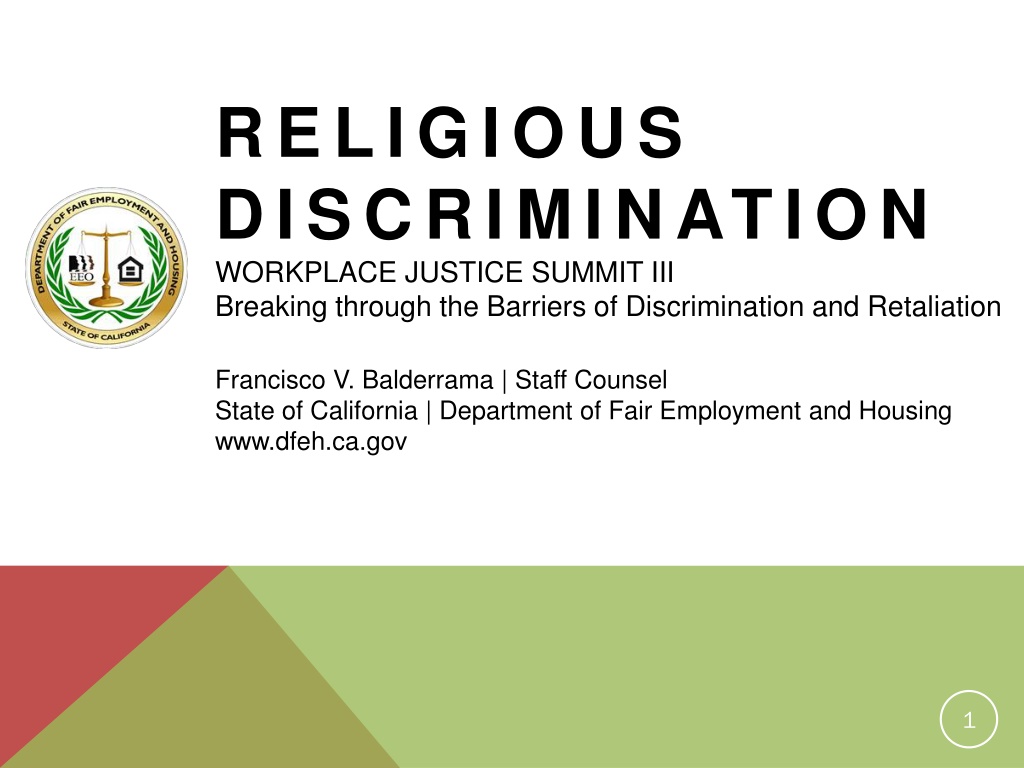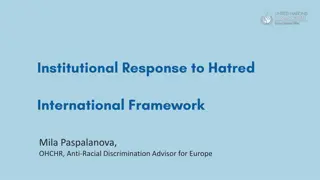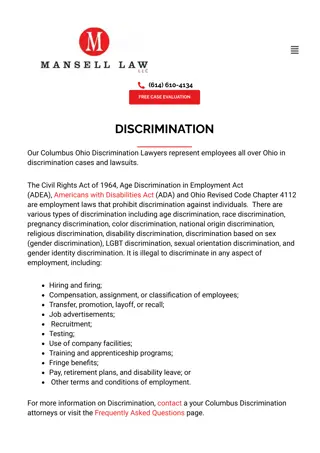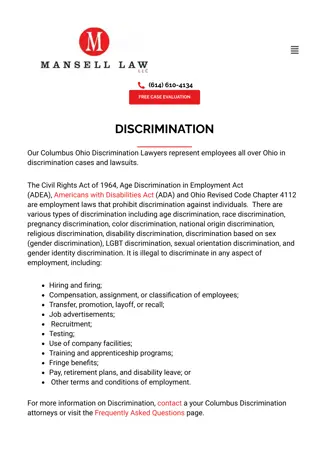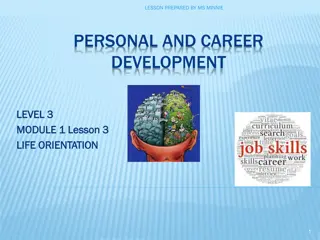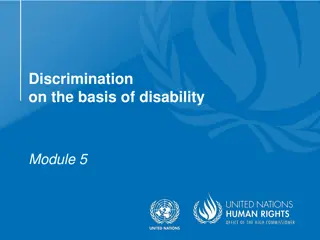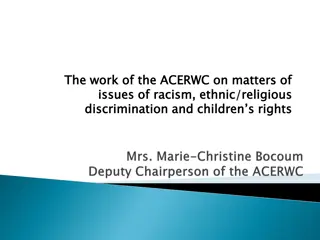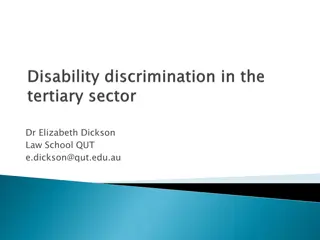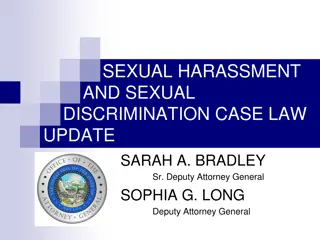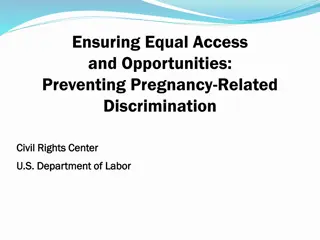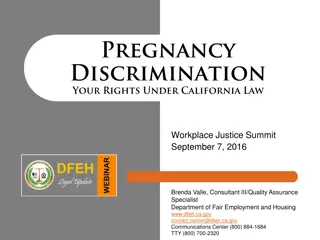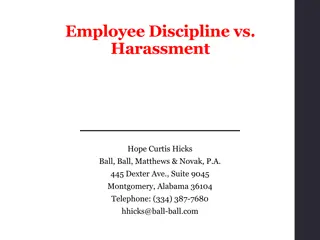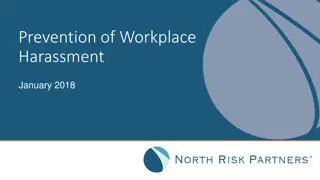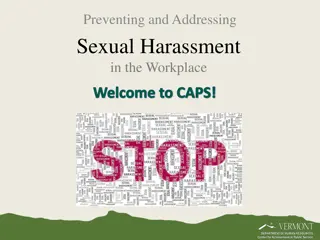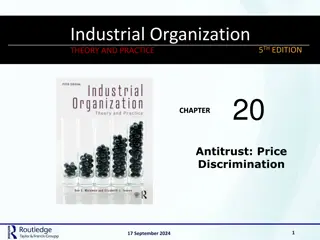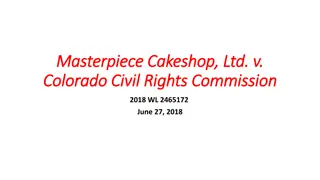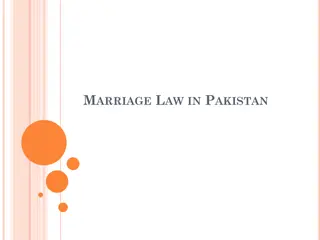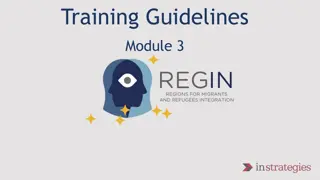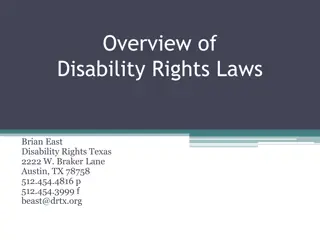Understanding Religious Discrimination Laws in California Workplace
Learn about the regulations and protections under FEHA and Title VII in California, including religious exemptions, accommodation requirements, case studies, and best practices to address discrimination issues effectively. Discover the statistical insights on religious discrimination complaints and the importance of balancing social needs in religious pluralism. Explore the limits on coverage for religious entities under FEHA exemptions.
- Workplace Discrimination
- California Laws
- Religious Accommodation
- Legal Protections
- Employment Rights
Download Presentation

Please find below an Image/Link to download the presentation.
The content on the website is provided AS IS for your information and personal use only. It may not be sold, licensed, or shared on other websites without obtaining consent from the author. Download presentation by click this link. If you encounter any issues during the download, it is possible that the publisher has removed the file from their server.
E N D
Presentation Transcript
RELIGIOUS DISCRIMINATION WORKPLACE JUSTICE SUMMIT III Breaking through the Barriers of Discrimination and Retaliation Francisco V. Balderrama | Staff Counsel State of California | Department of Fair Employment and Housing www.dfeh.ca.gov 1
OVERVIEW 1. Introduction regarding DFEH 2. Basic protections under the FEHA and related laws 3. Religious entity and ministerial exemptions 4. Definition of religion 5. Religious accommodation 6. Case law and hypothetical examples 7. Best practices 8. Ralph Act 2
STATISTICS Small but significant: 878 complaints filed with DFEH in 2015 that alleged religious discrimination. Majority of complaints involve denials of requests for reasonable accommodation, where religious imperatives allegedly conflict with employer policies on scheduling, dress, grooming, and other matters. 3
BASICS Similarities with other areas of discrimination Similarities with other areas of discrimination Disability discrimination (reasonable accommodation requirement) Sexual harassment (severe or pervasive requirement) 4
STATUTORY BASES FOR PROTECTION FEHA. (Gov. Code, 12940.) Prohibits discrimination because of religious creed. Title VII. (42 U.S.C. 2000e-2(a).) Prohibits discrimination because of religion. 5
FEHAS STATEMENT OF PURPOSE The freedom to worship as one believes is a basic human right. To that end, the accommodation of religious pluralism is an important and necessary part of our society. Questions of religious discrimination and accommodation to the varied religious practices of the people of the State of California often arise in complex and emotionally charged situations; therefore, each case must be reviewed on an individual basis to best balance often contradictory social needs. (Cal. Code Regs., tit. 2, 11059.) 6
LIMIT ON COVERAGE: RELIGIOUS ENTITIES FEHA exemption. Religious organization exception. (Gov. Code, 12962, subd. (d).) o Religious corporation. o Not organized for private profit. However, hospitals and health care facilities open to the public are subject to the FEHA even if owned by or affiliated with religious entities. (Gov. Code, 12926.2.) 7
LIMIT ON COVERAGE: RELIGIOUS ENTITIES [Narrower] Title VII exemption. Prohibition against discrimination shall not apply to a religious entity with respect to the employment of individuals of a particular religion to perform work connected with carrying on by such [entity] of its activities. (42 U.S.C. 2000e-1.) Ministerial exception. Constitutional exemption (U.S. Const., amend. I.) Actually an affirmative defense 8
REASONABLE ACCOMMODATION: PRIMA FACIE CASE Courts follow a two-part burden-shifting framework to analyze religious accommodation claims. (California Fair Employment and Housing Com. v. Gemini (2004) 122 Cal. App.4th 1004, 1012.) First, an employee must show: (1) Sincerely held religious belief and practice that conflicted with a work duty; (2) Employee informed her employer of the conflict; and (3) Employer took an adverse action against the employee because of the conflict. (Ibid.; Gov. Code, 12940, subd. (l).) 9
DEFINITION OF RELIGION FEHA (Cal. Code Regs., tit. 2, 11060) o Religious creed includes any traditionally recognized religion as well as beliefs, observances, or practices, which an individual sincerely holds and which occupy in his or her life a place of importance parallel to that of traditionally recognized religions. It encompasses all aspects of religious belief, observance, and practice, including religious dress and grooming practices Federal (29 C.F.R. 1605.1) o In most cases whether or not a practice or belief is religious is not at issue. However, in those cases in which the issue does exist, the Commission will define religious practices to include moral or ethical beliefs as to what is right and wrong which are sincerely held with the strength of traditional religious views. 10
WHAT QUALIFIES AS A RELIGION? Three indicia of religion: Three indicia of religion: 1. Nature of the ideas in question 2. Comprehensiveness 3. Formal or external signs Well Well- -established belief systems may not qualify: established belief systems may not qualify: Veganism. (Friedman v. Southern Cal. Permanente Medical Group (2002) 102 Cal.App.4th 39.) Ku Klux Klan membership. (Bellamy v. Mason s Stores, Inc. (4th Cir. 1974) 508 F.2d 504.) 11
WHAT QUALIFIES AS A RELIGION? But non But non- -traditional religions may qualify: traditional religions may qualify: World Church of the Creator. (Peterson v. Wilmur Communications, Inc. (E.D. Wis. 2002) 205 F. Supp. 2d 1014 [preaching white supremacy].) Wiccan. (Benz v. Rogers Memorial Hosp., Inc. (E.D. Wis. 2006) 2006 WL 314407.) 12
SINCERELY HELD RELIGIOUS BELIEF OR PRACTICE All forms and aspects of religion, however unconventional, are protected. (Frazee v. Illinois Dept. of Employment Security (1989) 489 U.S. 829, 834.) Religious beliefs need not be acceptable, logical, consistent, or comprehensible to others in order to merit protection. (Thomas v. Review Bd. of Indiana Employment Sec. Division (1981) 450 U.S. 707, 714-16.) 13
WHAT QUALIFIES AS SINCERELY HELD Employee need not be especially faithful or consistent in practice. o Pozo v. J&J Hotel Co. (S.D.N.Y. 2007) 2007 WL 137640318 [Catholic sincere about attending mass even though she was unable to identify all the elements of a Catholic mass].) o Cooper v. Oak Rubber Co., (6th Cir. 1994) 15 F.3d 1375 (employee able to claim accommodation from working on Sabbath despite having worked on the Sabbath in preceding months). Employee s religious group need not accept belief espoused by the employee. (29 C.F.R. 1605.1.) . 14
CONFLICT WITH WORK Common religious observances conflicting with work include: Observing Sabbath; Praying or performing other religious activities during work hours; Missing work to mourn for deceased relative; Refusing to submit for medical exam; Refusing to join union or pay union dues; Adopting certain grooming standards (e.g., beards); Wearing certain clothing or heading covering; and Displaying certain jewelry, objects, or tattoos. . 15
NOTICE TO EMPLOYER OF CONFLICT Employer must know of religious nexus to belief or practice. McGlothin v. Jackson Mun. Separate Sch. District (S.D. Miss. 1992) 829 F. Supp. 853, 856-58 (employee s work attire she described as Rastafarian found not to be obviously religious and she had the burden to notify her employer that its dress requirements violated her religious beliefs). Only minimal notice required. California Fair Empl. and Hous. Com n v. Gemini (2004) 122 Cal.App 4th 1004, 1016 (employee was not required explain how and why religion requires accommodation). 16
TWO-PART BURDEN-SHIFTING TEST: EMPLOYERS BURDEN Second Part Second Part Once an employee establishes a prima facie case, the burden shifts to the employer to show: (a) One or more elements of the employee s prima facie case elements isn t true; or (b) Employer offered a reasonable accommodation; or (c) Employer could not accommodate the belief or practice without undue hardship. 17
EMPLOYERS DUTY Employer has an affirmative duty to: Reasonably accommodate so long as doing so does not result in undue hardship to the employer. (42 U.S.C. 2000e(j).) Employer must provide reasonable accommodation unless so doing would result in an undue hardship. (Gov. Code, 12940, subd. (l).) explored any available reasonable alternative means of accommodating the religious belief or observance (Gov. Code, 12940, subd. (l)(1).) 18
REASONABLE ACCOMMODATION Federal statute: Federal statute: All aspects of religious observance, practice, as well as beliefs. (42 U.S.C. 2000e (j).) California statute: California statute: Observance of a Sabbath or other religious holy days and reasonable time needed for associated travel. (Gov. Code, 12940, subd. (l).) All aspects of religious belief, observance, and practice. (Gov. Code, 12926, subds. (o) & (p).) 19
AB 1964 FEHA AMENDMENTS Effective January 1, 2013, the FEHA was amended to : Clarify that an employer s obligation to accommodate employees religious beliefs or observances includes accommodating religious dress and grooming practices, as defined; (Gov. Code, 12926, subd. (p), 12940 subd., (l)(1).) Clarify that the standard for determining whether a religious accommodation poses an undue hardship is the same standard used for evaluating disability accommodations; (Gov. Code, 12926, subd. (t), 12940, subd. (l).) State expressly that an accommodation is not reasonable if it requires segregation of an employee from customers or the general public. (Gov. Code, 12940, subd. (l)(2).) Provide that a religious accommodation is not required if it violates the civil rights of another. (Gov. Code, 12940, subd. (l)(3).) 20
EXAMPLES OF REASONABLE ACCOMMODATION California Code of Regulations examples: California Code of Regulations examples: Interview and examination times Exception to employer s dress and grooming standards Union dues Allowing time off equal to replaced non-regularly scheduled time worked. (Cal. Code Regs., tit. 2, 11062, subd. (a).) Federal Regulations examples: Federal Regulations examples: Voluntary substitutes and swaps. Flexible scheduling. Lateral transfers and change of job assignments. (29 C.F.R. 1605.2 (d)(1)(i), (ii), (iii).) 21
WHAT IS A REASONABLE ACCOMMODATION? A reasonable accommodation eliminates the conflict between employment requirements and religious practices. Wright v. Runyon (7th Cir. 1993) 2 F.3d 214, 217. Neither state or federal law guarantees the employee gets the accommodation of his or her choice. Ansonia Board of Education v. Philbrook (1986) 479 U.S. 60, 68. 22
REASONABLE OFFER OF ACCOMMODATION Employee allowed to add Have a Blessed Day on internal correspondence. Anderson v. U.S.F. Logistics (IMC), Inc. (7th Cir. 2001) 274 F.3d 470, 476. 23
NOT A REASONABLE ACCOMMODATION OFFER Allowing employee to attend church but still requiring employee to work on afternoon or evenings on where the employee observes the Sabbath the entire day was not a reasonable accommodation. (Baker v. the Home Depot (2nd Cir. 2006) 445 F.3d 541.) Closing ears during religious portion of company s monthly meetings was not a reasonable accommodation. (Young v. Southwestern Sav. & Loan Ass n (5th Cir. 1975) 509 F.2d 140.) An accommodation is not reasonable if it requires segregation of an employee from customers or the general public. (Gov. Code, 12940, subd. (l)(2).) 24
UNDUE HARDSHIP It is not necessary for an employer to provide a reasonable accommodation if it would result in an undue hardship. 25
WHAT IS AN UNDUE HARDSHIP? Federal Law: Federal Law: If accommodation would impose more than a de minimis cost or burden, it is an undue hardship. (Trans World Airlines, Inc. v. Hardison (1977) 432 U.S. 63, 84.) California Law: California Law: Undue hardship means an action requiring significant difficulty or expense. (Gov. Code, 12926, subd. (t), 12940, subd. (l).) 26
FACTORS FOR UNDUE HARDSHIP Government Code section 12926, subdivision (u): (1) The nature and cost of the accommodation needed. (2) The overall financial resources of the facilities involved in the provision of the reasonable accommodations, the number of persons employed at the facility, and the effect on expenses and resources or the impact otherwise of these accommodations upon the operation of the facility. (3) The overall financial resources of the covered entity, the overall size of the business of a covered entity with respect to the number of employees, and the number, type, and location of its facilities. (4) The type of operations, including the composition, structure, and functions of the workforce of the entity. (5) The geographic separateness, administrative, or fiscal relationship of the facility. 27
VIOLATION OF THE LAW = UNDUE HARDSHIP Employer can terminate or refuse to hire an employee, who refuses to provide a social security number as required by federal law. (Baltgalvis v. Newport News Shipbuilding, Inc. (E.D. Va. 2001) 132 F.Supp.2d 414.) A religious accommodation is not required if it violates the civil rights of another. (Gov. Code, 12940, subd. (l)(3).) 28
VIOLATION OF A CBA = UNDUE HARDSHIP Duty to accommodate does not require employer take steps inconsistent with otherwise valid collective bargaining agreement. (Trans World Airlines, Inc. v. Hardison (1977) 432 U.S. 63.) Mere existence of a seniority system does not constitute a complete bar to a reasonable accommodation claim. (Balint v. Carson City (9th Cir. 1999) 180 F.3d 1047, 1053.) 29
PROSELYTIZING = UNDUE HARDSHIP Employer not required to allow employee to share faith by discussing religion with clients, displaying religious items in cubicle, or using conference room for prayer meetings. (Berry v. Department of Social Services (9th Cir. 2006) 447 F.3d 642, 655.) Employer not required to accommodate devout Christian employee who wanted to post scripture passages intending to demean homosexual coworkers. (Peterson v. Hewlett-Packard Co. (9th Cir. 2004) 358 F.3d 599, 607-08.) Employer provided reasonable alternatives and allowing employee to wear graphic anti-abortion button was an undue hardship. (Wilson v. U.S West Communications (8th Cir. 1995) 58 F.3d 1337, 1341.) 30
VIOLATING APPEARANCE GUIDELINES? Employer may prevent a member of the Church of Body Modification from wearing facial piercings. (Cloutier v. Costco Wholesale Corp. (1st Cir. 2004) 390 F.3d 126, 132, 136.) Employer not required to permit a Sikh employee to wear a beard where the appearance policy was based on the necessity of wearing a respirator with a gas-tight face seal. (Bhatia v. Chevron U.S.A., Inc. (9th Cir. 1984) 734 F.2d 1382.) But But Employer discriminated against Muslim woman by denying her request to wear a hijab (headscarf) in sales associate job when undue hardship argument based on speculative testimony. (EEOC v. Abercrombie & Fitch, Inc., (N.D.Okla. 2011) 798 F.Supp.2d 1272.) 31
THE ELIMINATION STANDARD Where the negotiations do not produce a proposal by the employer that would eliminate the religious conflict, the employer must either accept the employee's proposal or demonstrate that it would cause undue hardship were it to do so. EEOC v. Townley Eng'g & Mfg. Co. (9th Cir. 1988) 859 F.2d 610, 615, cert. denied, 489 U.S. 1077 (1989). Opuku-Boateng v. State of Cal. (9th Cir. 1996) 95 F.3d 1461, 1467. 32
BONA FIDE OCCUPATIONAL QUALIFICATION Government Code section 12940 unless based upon a bona fide occupational qualification 42 U.S.C. 2000e-2(e)(1) on the basis of his religion, sex, or national original in those certain instances where religion, sex, or national origin is a bona fide occupational qualification reasonably necessary to the normal operation of that particular business or enterprise. 33
EXAMPLES OF BFOQ DEFENSE Employer s paid chaplaincy positions requires that the chaplain be a clergy of the denominated faith in order to conduct the position's duties. (McCollum v. Cal. Dep't of Corrections and Rehabilitation (9th Cir. 2011) 2011 WL 2138221.) Clean-shavenness can be a bona fide occupational qualification. EEOC v. Sambo's of Georgia, Inc. (N.D. Ga. 1981) 530 F.Supp. 86, 91. Cloutier v. Costco Wholesale (D. Mass. 2004) 311 F.Supp.2d 190, 200. Hussein v. Waldorf-Astoria (S.D.N.Y. 2001) 134 F.Supp.2d 591, 599. 34
HARASSMENT Seem to be rarely encountered in practice (and even more rarely in published decisions), claims of harassment based upon religion involve the same principles established in connection with sexual harassment under Title VII and the FEHA. Like in sexual harassment cases, severe or pervasive conduct required Foreman made approximately 4 statements daily over a three-week period to Employee and others, i.e., Your religion is nothing, less than my religion; I'm a better person than you guys because your religion is less than my religion; I'm a Mormon and you guys are less than me. Due to the frequency and nature of these demeaning comments, a reasonable non-Mormon worker could be offended, especially coming from Employee's supervisor--a reasonable jury could find the conduct sufficiently pervasive to create a hostile work environment. (Robles v. Agreserves, Inc.(2016 WL 323775, *16.) 35
REMEDIES FOR RELIGIOUS DISCRIMINATION Reinstatement. Lost salary or wages. Transfer. Purge of personnel file. Emotional distress. Punitive damages. Court-ordered policy changes and training. Attorneys fees and costs 36
HYPOTHETICAL 1 An employee ate cat food at work everyday and the employer sought to stop this behavior. The employee claimed employment discrimination based on his personal religious creed that certain brand of cat food was contributing significantly to his state of well-being and therefore to his overall work performance as eating the Kozy Kitten cat food increased his energy. Did the employer violate religious discrimination provisions under federal and/or Did the employer violate religious discrimination provisions under federal and/or state law? state law? Brown v. Pena (D.C.Fla. 1977) 441 F.Supp. 1382. 37
HYPOTHETICAL 2 A teacher worked for a Lutheran Church school. Her job included teaching secular subjects as well as a religious class, leading students in daily prayer and devotional exercises, and taking her students to weekly chapel services. The teacher developed narcolepsy and the school offered her severance pay for her resignation. She refused and was fired for insubordination. Did the employer violate religious discrimination provisions under federal Did the employer violate religious discrimination provisions under federal and/or state law? and/or state law? Hosanna-Tabor Evangelical Lutheran Church and School v. E.E.O.C. (2012) 132 S.Ct. 694. 38
HYPOTHETICAL 3 East Indian co-workers continuously taunted a Pakistani employee for being a Muslim terrorist. They refused to work with him on projects and sent an e-mail inviting all staff to the employee s birthday party. When the guests and the employee arrived, the co-workers falsely claimed that the employee was celebrating the anniversary of 9/11. The employee reported the incidents to his supervisor, who did nothing to stop the conduct. 1. 1. Did the employer violate religious harassment provisions under the FEHA? Did the employer violate religious harassment provisions under the FEHA? 2. 2. Under current law, would it be illegal for an employer to segregate any Muslim Under current law, would it be illegal for an employer to segregate any Muslim employee to a different area in order to protect him or her from being taunted by employee to a different area in order to protect him or her from being taunted by co co- -workers? workers? Rehmani v. Superior Court (2012) 204 Cal.App.4th 945 39
HYPOTHETICAL 4 A quality assurance manager who supervised an openly gay employee told the employee that the Bible says that homosexuality is a sin and that her relationship with a woman was the cause of the turmoil and unhappiness in her life. The two prayed together and the employee said this had caused her to be born again. The manager said that sometimes there is a higher calling than a company policy. However, the employer terminated the manager from her supervisor position for harassing the employee over her sexual orientation. The manager claimed she was discriminated against because of her Christian beliefs. Did the employer violate the religious discrimination provision of federal Did the employer violate the religious discrimination provision of federal and/or state law? and/or state law? Bodett v. CoxCom, Inc. (9th Cir. 2004) 366 F.3d 736 40
BEST PRACTICES Suggestions for employers to protect against and prevent Suggestions for employers to protect against and prevent claims of religious discrimination: claims of religious discrimination: Common sense Non-discrimination company policy Training Document all attempts to interact or accommodate Investigate in a timely fashion Consider offering a severance agreement 41
SUMMARY AND CONCLUSION Dress and appearance issues should be routinely accommodated, unless they raise significant health or safety issues. Workers should not be laterally transferred away from the general public due to their religious displays/appearance. Scheduling accommodations should be routinely accommodated, unless the cost of doing so becomes a significant difficulty or expense. 42
RALPH ACT Cal. Civ. Code Cal. Civ. Code 51.7 (a) All persons within the jurisdiction of this state have the right to be free from any violence, or intimidation by threat of violence, committed against their persons or property because of political affiliation, or on account of any characteristic listed or defined in subdivision (b) or (e) of Section 51, or position in a labor dispute, or because another person perceives them to have one or more of those characteristics. The identification in this subdivision of particular bases of discrimination is illustrative rather than restrictive. 51.7 43
TRENDS IN RELIGIOUS HATE VIOLENCE Third most common type of hate crime Hate crimes with an anti-Jewish motivation continue to be most common Hates crimes against Sikh individuals since Sept. 11th 44
THANK YOU! THANK YOU! www.dfeh.ca.gov www.dfeh.ca.gov contact.center@dfeh.ca.gov contact.center@dfeh.ca.gov (800) 884 (800) 884- -1684 1684 45
